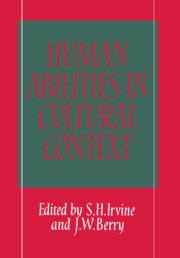Book contents
- Frontmatter
- Contents
- List of contributors
- Preface
- Acknowledgments
- Part I Human abilities in theoretical cultures
- Part II Cultural responses to ability measurement
- 7 The British “cultural influence” on ability testing
- 8 Cultural influences on patterns of abilities in North America
- 9 Human abilities in the Eastern Mediterranean
- 10 The Norwegian experience of test use: A selective review of Norwegian tests and measurements in cultural context
- 11 Human assessment in Australia
- 12 Test performance of blacks in Southern Africa
- 13 Individual differences among the peoples of China
- 14 Japanese abilities and achievements
- Part III Cultural limits upon human assessment
- Author index
- Subject index
8 - Cultural influences on patterns of abilities in North America
from Part II - Cultural responses to ability measurement
Published online by Cambridge University Press: 13 January 2010
- Frontmatter
- Contents
- List of contributors
- Preface
- Acknowledgments
- Part I Human abilities in theoretical cultures
- Part II Cultural responses to ability measurement
- 7 The British “cultural influence” on ability testing
- 8 Cultural influences on patterns of abilities in North America
- 9 Human abilities in the Eastern Mediterranean
- 10 The Norwegian experience of test use: A selective review of Norwegian tests and measurements in cultural context
- 11 Human assessment in Australia
- 12 Test performance of blacks in Southern Africa
- 13 Individual differences among the peoples of China
- 14 Japanese abilities and achievements
- Part III Cultural limits upon human assessment
- Author index
- Subject index
Summary
It has long been recognised – as several of the chapters in this volume attest – that cultural differences between groups may exert a profound influence on the differential development of distinct patterns of mental abilities. Ferguson (1954) states succinctly that “individuals reared in different cultures will develop different patterns of abilities” (p. 104). A similar appreciation of the role of culture in shaping mental development may be found in most of the work in which this issue has been addressed.
In this chapter, we discuss cultural influences on patterns of abilities within North America, or, more specifically, within the United States. As will be seen, a quite considerable body of research has sought to describe patterns of abilities typical of the members of different subgroups living in the United States and to attribute these differences to cultural characteristics specific to each of the various groups. This research is described in some detail below, although we will anticipate the conclusion we have drawn from it by suggesting now that much of it has been equivocal. Contrary to what appears to be a prevalent belief, it is not an established fact that members of different cultural or ethnic groups in the United States – for example, whites, blacks, Chinese, Jews, and Puerto Ricans – typically develop different patterns of abilities or different profiles of mean performance levels on such ability dimensions as verbal comprehension, spatial relations, and reasoning. Furthermore, when such patterns appear to emerge, their nature and meaning are by no means clear nor is their social and educational import.
- Type
- Chapter
- Information
- Human Abilities in Cultural Context , pp. 208 - 231Publisher: Cambridge University PressPrint publication year: 1988
- 5
- Cited by



